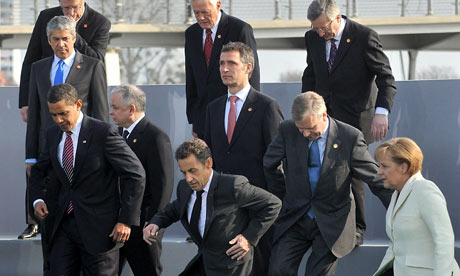Frienemies
 Barack Obama's sales pitch during the 2008 campaign included the notion that he would - almost single-handedly, by virtue of his unique background and life experiences - restore America's standing in the world, and strengthen alliances with our partners. After his star turn at last week's G20 Summit, President Obama paid a call on NATO in the hopes of gaining Europe's assent to increase their troop contribution to the military effort in Afghanistan.
Barack Obama's sales pitch during the 2008 campaign included the notion that he would - almost single-handedly, by virtue of his unique background and life experiences - restore America's standing in the world, and strengthen alliances with our partners. After his star turn at last week's G20 Summit, President Obama paid a call on NATO in the hopes of gaining Europe's assent to increase their troop contribution to the military effort in Afghanistan.
But when Obama made his plaintiff plea for more military support, to describe the NATO response as muted would be a rebuff to the mute.
The current plan is that NATO will send a grand total of 5,000 military personnel to help with the effort in Afghanistan. To make matters worse, 3,000 of those to be deployed are only committed for a temporary deployment to secure Afghan national elections in August. Another contingent will be utilized to beef up Afghanistan's military so that it can more effectively police the country.
A bit of perspective is in order. Given the naked contempt in which George W. Bush was held in the capitols of Europe and the adoration that all of Europa lavished on Candidate Obama, one would assume that European heads of state would have gone through all manner of contortions to meet this request from the Great Himself. As much would seem especially true given that Afghanistan was the war that the U.S. and its allies considered - after the September 11, 2001 attacks as well as the 3/11 Madrid train bombings - to be the "just war."
Unfortunately, out of 28 NATO member countries, only nine - to include Germany, Britain, Poland, Spain and Italy - even bothered to pony up anything at all. This may be a reflection of the fact that (as noted by the Financial Times) "clear majorities of people in the UK, France, Italy and Germany believe that their governments must not send more forces to Afghanistan." Some 60 percent of German respondents to the survey said they would not wish Berlin to send more troops to Afghanistan under any circumstances. Even in the UK, the second largest contributor to NATO's mission in Afghanistan, some 57 percent of respondents rejected calls for any more British troops to be sent.
Europe's recalcitrance does not entirely surprise. According to Gallup polling, 42 percent of Americans (and 53 percent of Democrats) now view the Afghan war as "a mistake."
In both France and Italy, some 53 percent of people said their countries should not send troops. Only in Spain is there a majority willing to consider sending additional troop numbers.
As the globe turns east, the problems hardly cease. With North Korea's most recent ballistic missile launch attempt having fizzled, the Obama administration made the case that longer term international security interests are served by reducing nuclear weapons stockpiles, as well as enforcing sanctions against the North Korean regime. While he has made some progress with the former in discussions with his Russian counterpart, Dmitri Medvedev, he has had considerable resistance from Russia in the way of their refusal to denounce the missile launch as a violation of the 2006 sanctions imposed on North Korea.
So even as Obama has essentially bowed to Russia's wish that a missile defense system not be deployed in Poland and the Czech Republic, it has been a struggle to get any sort of Russian reciprocity in an attempt to disrupt North Korea's nuclear program (or for that matter, Iran's.)
It becomes evident that there are many people here and abroad who are at best indifferent to the notion of a muscular American foreign policy. In contrast to the Bush years, the natural impulse of Obama and the Democrats is to apologize and then act. As discussed elsewhere, the lack of meaningful activity on the part of our "allies" vis-a-vis terrorism can be explained by the fact that - as Mark Stein so correctly described it in a December 2003 Wall Street Journal op-ed - the Left resents the idea of a struggle against the existential threat of terror, in as much as it distracts from their "ushering in the era of lots and lots of itsy bits of small government." They loved the '90s because you never heard a thing about macho stuff like war: it was all micro-politics, new regulations for this, new entitlements for that - education, environment, "social justice." For hard-core Democrats, the whole war thing is an unwelcome intrusion on what large numbers of people had assumed to be a permanent post-Martian politics.
As long as our erstwhile European stalwarts are more concerned about global climate change, assimilating Arab immigrants, redistributing (as opposed to creating) wealth and social equality, wars and rumors of wars will always be an unwelcome interruption. To the progressive, terrorist acts are a symptom of the diseases of American imperialism and militarism, with Western pacifism being the only cure.
So much for good friends!











.jpg)









No comments:
Post a Comment